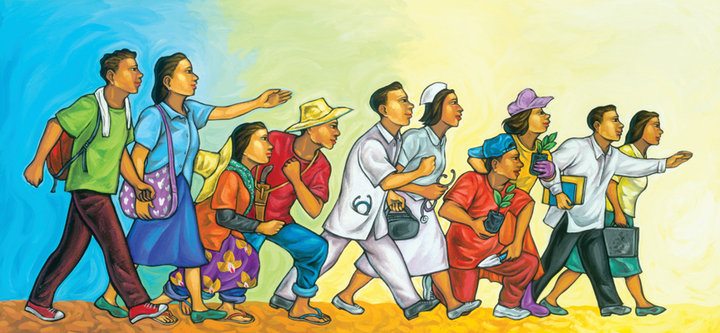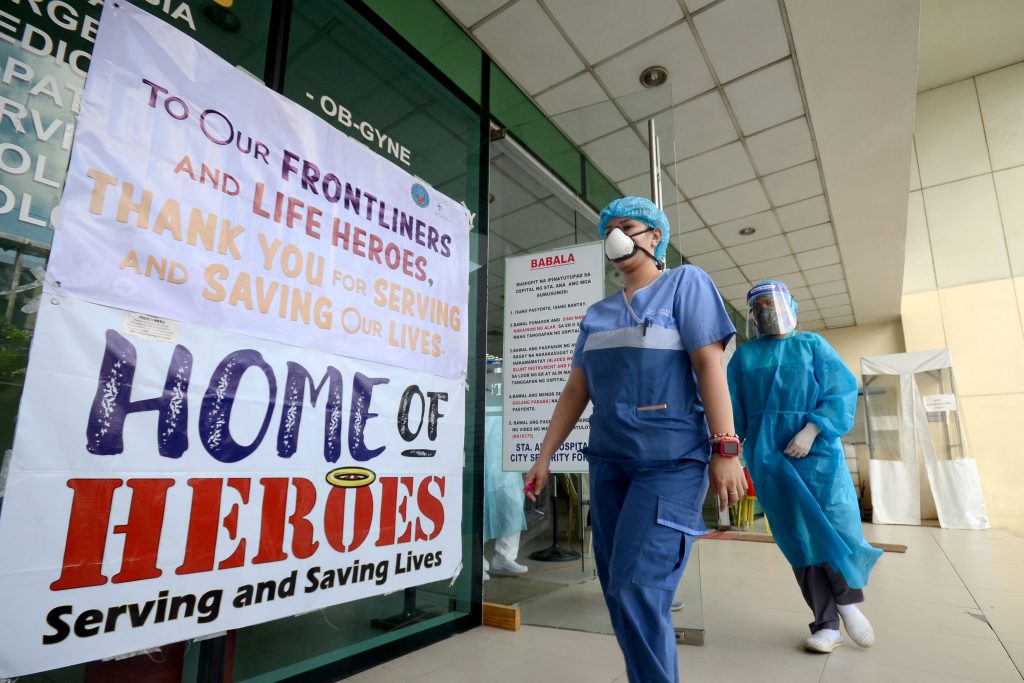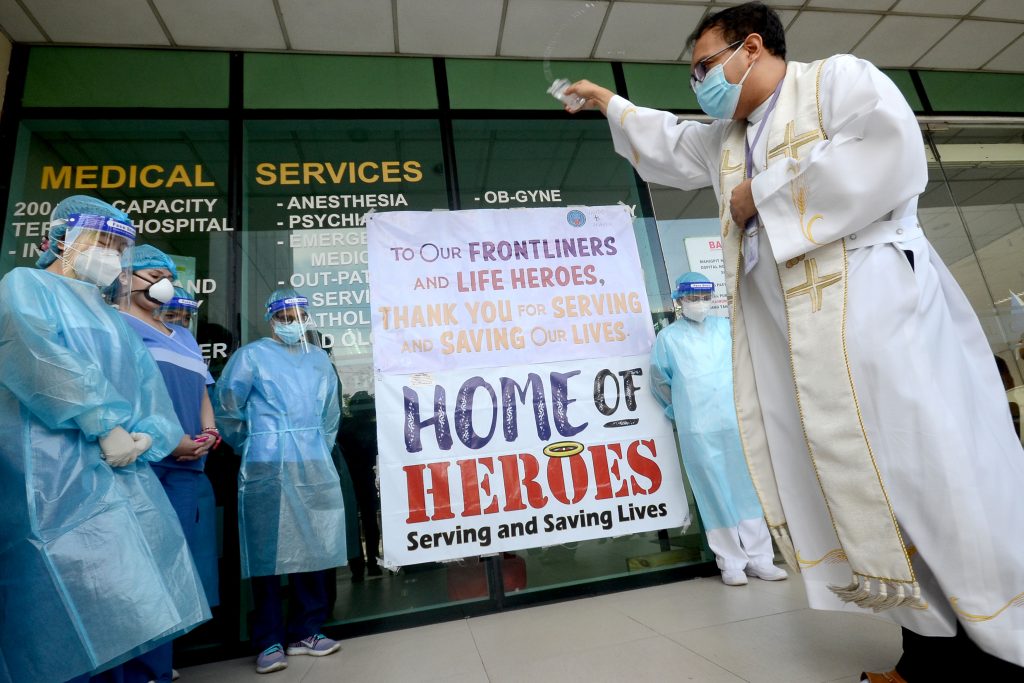
Her father used to say that a person doesn’t need wealth and fame to become a hero. The old man believed that “small acts of compassion” are already a “form of heroism.”
“He was my hero,” said Doctor Christine Paden about her father who died a few months after she passed the medical board examinations in 2015.
Her hero died before she was able to fulfill her promise to become “a warrior for those who need care.”
Doctor Paden, 35, now heads a village health unit in the outskirts of the Philippine capital in the city of Caloocan.
“If he is here right now, I know he would be proud,” she said of her dad. “He taught us never to refuse to give or extend help especially to those who have less in life.”
The young doctor said she and her siblings chose the field of medicine and law because of their father’s constant reminder to “always tend to the people.”
She said her father’s words are her inspiration to face the challenges brought about by the coronavirus pandemic.
Doctor Paden said she too felt fear especially upon hearing reports that many frontline healthcare workers died because of the disease.
“It brings fears and anxiety but also the enthusiasm to carry on the fight,” she said.
“Somebody has to do it and that somebody is us because we spent years in the university and in hospitals for this kind of crisis. We cannot just quit,” said the doctor.
Doctor Paden could have chosen to work in a private hospital or in a larger medical institution, but she decided to stay in a small village health center.
“The poorest in society and the majority of those who need medical care but cannot afford to go to the hospital go to village health centers,” she said.
She told LiCAS.news that the “first line of defense” of the country’s healthcare system is in village health centers. “This is where we need more doctors and nurses.”
Since the onset of the coronavirus pandemic, Doctor Paden and her team have been busy monitoring cases of the new coronavirus disease on top of other illnesses in the village.
Every day, she would call on her patients to check on their status and visit those who need physical assessment.
She did not disclose how many patients she is handling but she said one day is not enough if she will do the monitoring alone.
Doctor Paden said it breaks her heart when she has to put on her white coat again in the middle of the night to send to a hospital a patient who develops a severe case of COVID-19.

Cost to pay
Like everyone else, Doctor Paden has to make sacrifices to keep herself and her loved ones protected during the pandemic.
“Loving from a distance,” that’s how she described her relationship with her family now. “I have to stay away from my mother and siblings for a while to keep them safe.”
She wears protective equipment even if she’s only in the office because “I am considered high risk because of asthma,” an adult-onset.
Doctor Paden was the healthiest among the siblings, but she acquired asthma after she became a doctor and worked in various medical facilities.
“There were days during my early years in the profession that my body would just shut down because of fatigue. Then I became asthmatic,” she said.
But of all the sacrifices that she has to take, there is one thing that she is most worried about.
“We decided not to get pregnant while we are in this pandemic. And it is a risk that I have to take,” she said.
She’s already in her mid-30s and bearing a child could be dangerous, especially during the pandemic.
The young doctor is married to a nurse who works for the country’s Department of Health.
“Duty comes first,” she said. “I will have to give up my profession if I want to have a child during a pandemic because I cannot risk the child’s safety.”
Doctor Paden, however, believes that her sacrifices are “too small compared to those who acquired the disease and died” while tending to patients.
“That is the greatest sacrifice, but I don’t think it was necessary to let a doctor or a nurse die because of Covid-19. We could have done better,” she said.

Modern-day heroes
On August 31, Filipinos marked National Heroes Day.
People and institutions paid tribute to frontline medical workers who are now regarded as “modern-day heroes” because of their sacrifices during the pandemic.
The country has already lost at least 38 medical professionals due to the disease.
Church and labor groups honored “the hard work and heroism” of frontline healthcare workers, especially “those who died to keep others alive.”
Father Angel Cortez, executive secretary of the Association of Major Religious Superiors in the Philippines, said it is “not enough” to call them heroes.
“We must show them that we regard them as heroes and make them feel that they are not alone in this battle against the coronavirus pandemic,” he said.
The priest told LiCAS.news that the best way to pay tribute to the country’s medical workers “is to keep them alive and to provide them the tools and protection that they need.”
Father Cortez called on the faithful to offer their prayers for the safety of all frontline healthcare workers and “lend our hands to them if they will be needing our help.”
Elmer Labog of the labor group Kilusang Mayo Uno also paid tribute to the medical workers. “They are our modern heroes,” he said.
Lawyer Sonny Matula, president of the Federation of Free Workers, said the country has seen healthcare workers “still bravely fighting” despite low pay and lack of protective equipment.
“They care enough to make life worth living in this time of the pandemic. Despite the threat to their own lives, our health care workers are courageously healing those who are sick,” he said.
“They are our living heroes fighting on the frontlines and worthy to be recognized with our concrete attention on National Heroes Day,” he said.
Last week, Doctor Paden received two letters from patients, thanking her for the service and attention that she has been extending to them.
In the letters, the patients told the doctor how grateful they were because they don’t feel abandoned and stigmatized despite having the disease.
They also called the doctor and her team of village healthcare workers “heroes.”
While she’s grateful to people and patients who regard her as a “hero,” she said “I don’t see myself as one.”
“The real heroes are the common people who, despite the hardship and challenges due to the pandemic, are sharing whatever they have to make a community strong and united,” said the doctor.
“The real heroes are the people who serve as our inspiration to perform better and motivate us to continue the job amidst the dangers,” she said.
Source: Licas Philippines
0 Comments